- 1How to distinguish cable materials?
- 2How to conduct a visual inspection of wires and cables?
- 3How to evaluate the quality and performance of wires and cables?
- 4Troubleshooting of Low Voltage Automotive Wires: Common Problems and Solutions
- 5Application and Challenges of Low Voltage Automotive Wires in Electric Vehicles
- 6Analysis of Safety and Reliability of Low Voltage Automotive Wires
Japanese standard AVS
- Category:Low voltage automotive line
- Hits:1279次
- Release Date:2023-11-01
- Share:
- Inquiry
- Details
Japanese standard AVS automotive cable is a low-voltage cable mainly used for electrical and instrument connections in automobiles, motorcycles, and other types of motor vehicles. The conductor is made of multi stranded soft bare copper wire that complies with JIS C3102 standard, and this conductor has excellent conductivity. The insulation material is PVC, which has good heat resistance and mechanical properties. The working temperature range is from -40 ℃ to 85 ℃, and the highest temperature that can be reached instantly can reach 120 ℃.
The characteristic of Japanese standard AVS car wire is that the thinning of insulation thickness reduces the weight of the wire, reduces the outer diameter of the wire, and thus saves interior space. In addition, the Japanese standard AVSS automotive cable (polyvinyl chloride ultra-thin wall low-voltage automotive cable) is thinner than AVS, easy to cut and peel, and has significant advantages in lightweighting and reducing the diameter of wire harnesses.
Overall, Japanese standard AVS automotive cables have become the ideal choice for internal connection wires in automotive electrical systems due to their excellent heat resistance, flexibility, and wide applicability. However, when choosing Japanese standard AVS automotive cables, users still need to select appropriate types and specifications of wires based on the actual car model, electrical system requirements, and working environment.

 Combining strength and flexibility · Easy to move
Combining strength and flexibility · Easy to move
 中文
中文
